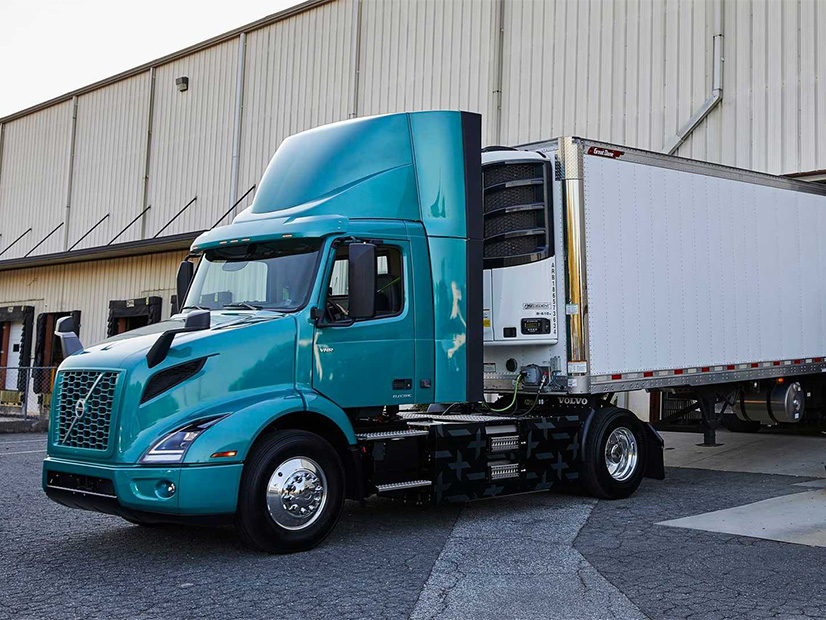
Nevada Gov. Steve Sisolak said Thursday that he has signed on to a multistate agreement to work toward a goal of 100% sales of zero-emission medium- and heavy-duty trucks by 2050.
Sixteen other states, the District of Columbia and the Canadian province of Quebec previously signed the memorandum of understanding, which was announced in July 2020.
The aim of the agreement is to accelerate the market for electric trucks, ranging from large pickups and vans to delivery trucks, school and transit buses, and long-haul vehicles. The group’s interim target is at least 30% zero-emission truck sales by 2030.
In addition to Nevada, signatories of the agreement include the states of California, Colorado, Connecticut, Hawaii, Maine, Maryland, Massachusetts, New Jersey, New York, North Carolina, Oregon, Pennsylvania, Rhode Island, Vermont, Virginia and Washington.
The jurisdictions represent 40% of the U.S. population and 35% of registered medium- and heavy-duty vehicles, according to Sisolak’s office.
Sisolak made the announcement via a pre-recorded video during a Las Vegas event hosted by the nonprofit Electrification Coalition.
“By working across states and with many partners, we can accomplish much more together than we could do individually,” Sisolak said.
Sisolak said the agreement will help Nevada meet its goal of net-zero greenhouse gas emissions by 2050 and position the state to respond to federal regulatory changes.
Reducing Risks
The Electrification Coalition welcomed the announcement.
“States are playing a key role in the vital work to transform our transportation system, and Nevada’s participation in this commitment represents a substantial boost to our momentum,” Katherine Stainken, the coalition’s vice president of policy, said in a statement.
In a June letter to Sisolak, the coalition urged Nevada to join the agreement to address the public health, economic and national security risks arising from the transportation sector’s oil dependence. The letter was signed by representatives of 41 businesses, including Amply, EVgo, Mack Trucks, Proterra, Rivian, Siemens, Volvo Group North America and Nestle USA.
Western Resource Advocates also commended Sisolak for bringing Nevada into the agreement.
“We applaud Gov. Sisolak for this important step that recognizes the need to reduce the harmful fossil-fuel emissions from medium- and heavy-duty trucks in Nevada that contribute to climate change,” Cameron Dyer, Western Resource Advocates’ managing senior staff attorney in Nevada, said in a statement.
But WRA called on the state to do more, including following California’s lead in adopting an Advanced Clean Trucks regulation. The regulation requires vehicle manufacturers to sell zero-emission trucks as an increasing percentage of their annual California sales from 2024 to 2035.
Draft Plan Released
Signatories to the agreement are working together through a ZEV task force being facilitated by the Northeast States for Coordinated Air Use Management (NESCAUM).
Last month, the group released a draft action plan that includes more than 60 recommendations for state policymakers to promote widespread deployment of zero-emission trucks.
The recommendations cover areas such as sales and fleet purchase requirements; purchase incentives for ZEVs and related infrastructure; electric utility and utility regulator actions; financing for fleet conversions; and outreach and education.
One of the plan’s recommendations is that states work together to support development of a standardized and reliable fast-charging network for trucks. States should also advocate for changes to federal law that would allow user-pay charging at interstate rest areas, the plan recommended.
And states should consider increasing weight limits for electric trucks, a step the federal government has already taken for trucks on interstate highways, the plan said.
“Current weight limitations can impact the payload capacity of battery-powered trucks, particularly long-haul freight trucks, because the additional weight of the battery system can result in reduced payload capacity,” the draft plan noted.
Comments on the draft plan will be accepted through April 25 and may be submitted through NESCAUM’s public input portal.



